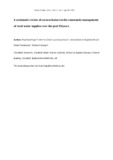JavaScript is disabled for your browser. Some features of this site may not work without it.
| dc.contributor.author | Hutchings, Paul | |
| dc.contributor.author | Chan, Mei Yee | |
| dc.contributor.author | Cuadrado, Lucie | |
| dc.contributor.author | Ezbakhe, Fatine | |
| dc.contributor.author | Mesa, Baptiste | |
| dc.contributor.author | Tamekawa, Chiaki | |
| dc.contributor.author | Franceys, Richard | |
| dc.date.accessioned | 2016-09-20T15:37:16Z | |
| dc.date.available | 2016-09-20T15:37:16Z | |
| dc.date.issued | 2015-03-14 | |
| dc.identifier.citation | Hutchings P. et al. (2015) A systematic review of success factors in the community management of rural water supplies over the past 30 years. Vol. 17, Iss. 5, pp 963-983 | en_UK |
| dc.identifier.issn | 1366-7017 | |
| dc.identifier.uri | http://dx.doi.org/10.2166/wp.2015.128 | |
| dc.identifier.uri | http://dspace.lib.cranfield.ac.uk/handle/1826/10557 | |
| dc.description.abstract | Community management is the accepted management model for rural water supplies in many low and middleincome countries. However, endemic problems in the sustainability and scalability of this model are leading many to conclude we have reached the limits of an approach that is too reliant on voluntarism and informality. Accepting this criticism but recognising that many cases of success have been reported over the past 30 years, this study systematically reviews and analyses the development pattern of 174 successful community management case studies. The synthesis confirms the premise that for community management to be sustained at scale, community institutions need a ‘plus’ that includes long-term external support, with the majority of high performing cases involving financial support, technical advice and managerial advice. Internal community characteristics were also found to be influential in terms of success, including collective initiative, strong leadership and institutional transparency. Through a meta-analysis of success in different regions, the paper also indicates an important finding on the direct relationship between success and the prevailing socio-economic wealth in a society. This holds implications for policy and programme design with a need to consider how broad structural conditions may dictate the relative success of different forms of community management. | en_UK |
| dc.language.iso | en | en_UK |
| dc.publisher | IWA Publishing | en_UK |
| dc.subject | community management | en_UK |
| dc.subject | participation | en_UK |
| dc.subject | rural water supply | en_UK |
| dc.subject | service delivery | en_UK |
| dc.subject | sustainability | en_UK |
| dc.title | A systematic review of success factors in the community management of rural water supplies over the past 30 years | en_UK |
| dc.type | Article | en_UK |
Files in this item
This item appears in the following Collection(s)
-
Staff publications (SWEE) [2827]
